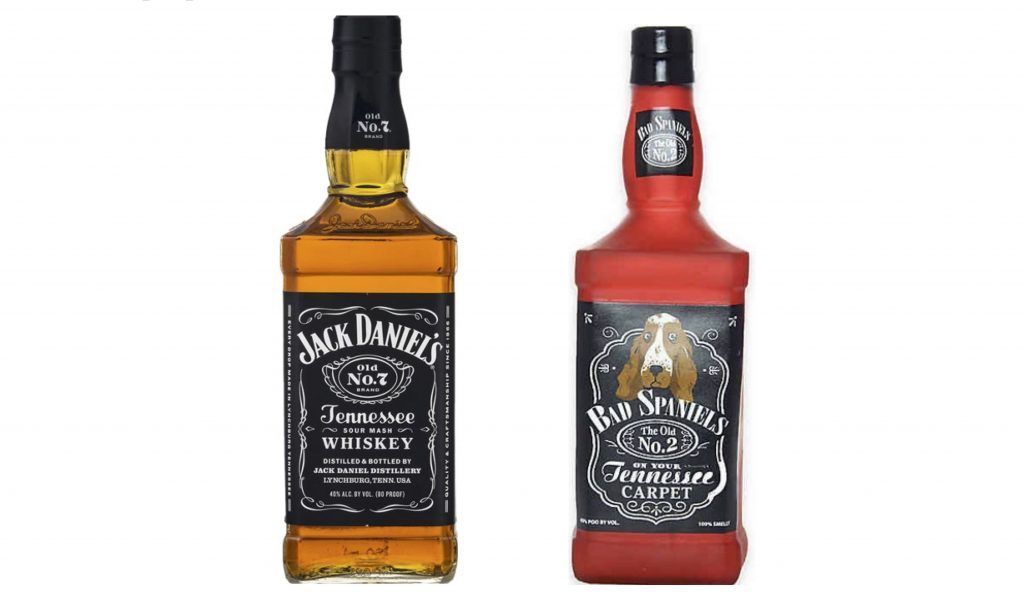High Court to Hear Arguments in Dog Toy Parody of Jack Daniels' Packaging
The U.S. Supreme Court will hear arguments Wednesday in a case in which Jack Daniel's Properties, a unit of Brown Forman that owns the intellectual property of Jack Daniels, is seeking to halt VIP Products from producing a dog toy that closely resembles a bottle of Jack
The U.S. Supreme Court will hear arguments Wednesday in a case in which Jack Daniel's Properties, a unit of Brown Forman that owns the intellectual property of Jack Daniels, is seeking to halt VIP Products from producing a dog toy that closely resembles a bottle of Jack Daniel's Old No. 7 Tennessee Whisky. How close? Judge for yourself from the picture below:

Jack Daniel's has sued VIP for trademark infringment and dilution. The trial court agreed and barred VIP Products from comtinuing to produce the Bad Spaniels toy. The toy in question, it found, was modeled after and closely resembles the square bottle in which Jack Daniel's has been marked since the 19th Century.
But the 9th Circuit reversed, seeing it as a First Amendment issue. Instead of describing Jack Daniel as "Old No. 7 Tennessee Sour Mash Whiskey" produced by Jack Daniel's the toy's label refers to a "Bad Spaniel" that makes "Old No. 2 on your Tennessee carpet.
“This case is no laughing matter. While the case involves dog toys, even allegedly ‘humorous’ knock-offs can confuse consumers as to what messaging and products well-known alcohol beverage brands endorse,” said Courtney Armour, Distilled Spirits Council Chief Legal Officer. “The alcohol beverage industry takes its commitment to responsible advertising very seriously and trademark infringers can severely undercut these efforts and jeopardize the industry’s credibility. Companies must have control over their trademarks to ensure responsible advertising initiatives are effective and succeed.”
DISCUS and the American Craft Spirits Association aren't the only organizations that didn't find Bad Spaniel humorous. No less than 19 business organizations file amicus curiae briefs in this case. Among those weighing in: Constellation Brands, Campari America, Levi Strauss, and Campbell Soup.
Jack Daniel's is basing its argument on the legal concept of the humorous use of another's trademark on a commercial product constitutes trademark infringement or dilution. It draws a stark picture of what may result from the 9th Circuits decision allowing continue use by Bad Spaniel of Jack Daniel's distinctive trade dress.
"Companies like VIP may market funny alcohol-themed rip-offs to children. Others may sell funny versions of popular food brands laced with marijuana. And mark holders will be powerless to stop them, because infringers will funnel litigation to the Ninth Circuit, as VIP did here,." Jack Daniel's petition for a hearing asserts.
Jack Daniel's also argues that the toy violates the Lanham Act because its use of Jack Daniel's trade dress may lead ton consumer confusion. It also alleges that the Bad Spaniel's trade dress dilutes or tarnishes the Jack Daniel's trademark because the similarity between the two harms the reputation of the famous mark.
The petition notes that Jack Daniel's maintains an active brand licensing program. Its trademarks and trade dress is licensed for pet products, including dog leashes, dog collars and dog houses.
After the 9th Circuit overturned a District Court finding that Bad Spaniels infringed Jack Daniel's trademark, and that Bad Spaniels use was "noncommercial because it conveyed a humorous message and was protected by the First Amendment." The 9th Circuit denied rehearing by a panel of judges and a hearing en banc, at which point Jack Daniel's petitioned for a writ of certiorari.
In asking the Supreme Court to hear the case, Jack Daniel's noted that the 9th Circuit Court of Appeals, as is so often the case, is the only appeals court to have embraced First Amendment protection for humorous trademark use conflicts with decisions of the 2dk 7th and 8th Circuits. The justices need to resolve this conflict among the U.S. appeals courts, it said.
The 4th, 5th and 10th Circuits have also embraced the likelihood of confusion test when analyzing commercial use of a mark. Jack Daniel's noted tat the 5th Circuit has held that parody "is not a defense to trademark infringement" but rather a "relevant factor" in analyzing the likelihood of confusion.
The 9th Circuit's decision creates another conflict, this one on liability for humorous use of another's trademark when analyzing humorous messages, which it held to be "noncommercial" and thus falling within the statutory "noncommercial use" exception to established trademark law. There is an existing exception for parodies but "the 9th Circuit did not even acknowledge the parody exception." No other circuit, Jack Daniel's noted, has read the "noncommercial" exclusion to turn exclusively on use of humor.
This is not a one-time incident, Jack Daniel's told the court. Rather the use of other people's trademarks has become more common, and the 9th Circuit's decision "threatens to supercharge" this trends. This trend has serious implications not only for trademark holders but also for public health and safety.
Jack Daniel's noted that children have been hospitalized after eating candy and foods sold in packaging that mimics well-known brands. In one case children couldn't distinguish between "Double Stuf Stoneos" and Nestle's Double Stuf Oreos.
"Infringers will have every incentive to stack the deck in their favor by funneling trademark litigation to the 9th Circuit, which already sees the highest volume of trade mark claims," Jack Daniel's said. It noted that VIP filed this action in the District of Arizona after Jack Daniel's sent it a cease-and-desist letter, as it has done in many other cases.
In its amicus brief, DISCUS and other industry members said they were concerned that if the 9th Circuit's decision on trademark liability was allowed to stand, it would immunize irresponsible and infringing use of alcohol beverage trademarks and trade dress, simply because such use is arguably humorous.”
“If ‘humorous’ uses become exempt from the Lanham Act, ‘humorous’ infringement promoting irresponsible drinking will gut leading producers’ efforts to ensure socially responsible advertising. . . . Infringement implying that popular brands support such activities harms the industry—and society—by associating the industry’s best-known names with problematic drinking,” the brief states.
"From children’s toys to drinking game kits to automobile accessories, those making infringing products need only employ humor to escape liability for trademark infringement or dilution,” the industry's brief says.
The amicus brief was filed by DISCUS, Beer Institute, Brewers Association, American Distilled Spirits Alliance, American Craft Spirits Association and Wine Institute.
